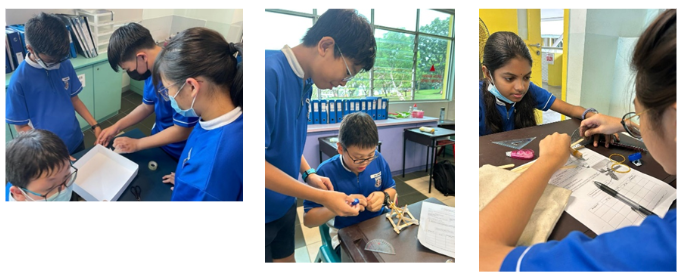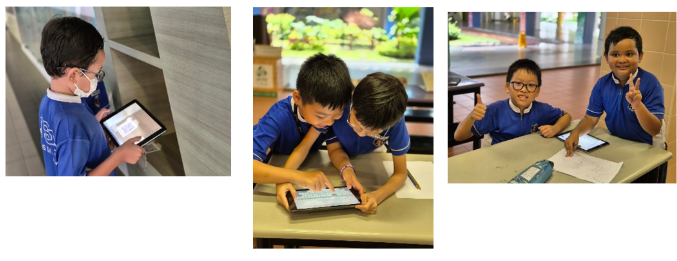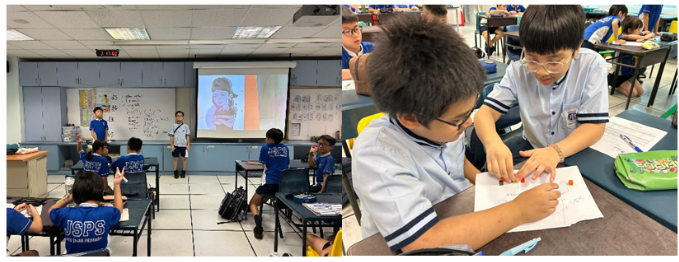Mathematics
Every JingShanite a Mathematical Problem Solver!
Guided by the Singapore Mathematics Curriculum Framework, lessons in the Jing Shan mathematics classroom is designed to provide learning experiences which would allow for the mastery of mathematical concepts and skills, inculcate positive attitudes towards learning and the development of metacognitive, reasoning and communicative skills which are essential for problem solving. This is in line with the school vision of ‘Thriving Explorers, Mindful Leaders’ which aims to develop unique individuals who are critical thinkers and reflective problem solvers and empathetic leaders who are collaborative, confident and active contributors.
.jpg)
Mathematics Learning within the classroom
Through the use of varied teaching resources such as hands-on manipulative,
teachers encourage learning math concepts through exploration which lead to
the development of deeper relational understanding. The provision of authentic learning experiences in
the classroom and purposefully engineered tasks develop the proficiency
required by the learners in carrying out skills such as visualizing space
and use of mathematical tools such as measuring and reading data on a weighing
scale.

Mathematics Learning within the classroom
Teachers
use varied resources like hands-on manipulatives to promote exploration
and deepen students’ understanding of math concepts. Authentic tasks and
real-world experiences help students develop skills such as spatial visualization
and using tools like measuring tapes and weighing scales.

Mathematical processes like reasoning and communication are important for solving problems and building knowledge. Students are given open tasks and problem-solving opportunities to apply concepts, express ideas clearly and demonstrate logical thinking using mathematical language.

Formative Assessment in the Mathematics Classroom
To take on an active role in learning, students need to understand where they are, where they are going and how to get there. Formative assessment strategies help them take ownership and engage actively in class. A classroom culture that values mistakes encourages opportunities for feedback and become a byproduct of active learning. Tools like All Students Response Systems and ICT-based simulations support timely intervention and concept exploration through varied representations.

Developing Positive Learning Attitudes through Alternative Assessment and Differentiated Programmes
A positive attitude towards mathematics - such as confidence, motivation and perseverance - contributes to one’s learning disposition and the inclination towards using mathematics to solve problems.
Alternative assessments like math journalling help students express their thinking and allow teachers to gain deeper insights into student progress beyond grades. It also promotes the use of mathematical language to communicate ideas clearly.
Tiered programmes cater to different student needs, allowing customised support. Programmes like LSM focus on building foundational fluency in lower and middle levels while upper levels emphasise process skills such as reasoning.

Mathematics Coaching Programme
With a small teacher-student ratio, weekly one-hour sessions are conducted.

For higher progress students, enrichment is provided through the E2K programme at P4 and P5 and participation in Mathematics Olympiads for selected students at the upper levels.

Learning beyond the Mathematics classroom
To build resilience, mindfulness and apply math in real-life contexts, learning extends beyond the classroom. Activities like budgeting and planning a birthday party help students develop practical skills through authentic, real-world scenarios.

These experiences involve non-routine, multi-stage tasks that require students to apply and connect mathematical concepts. They support knowledge transfer, reinforce learning and build real-world skills like collaboration, communication and empathy.

Home-based Learning in Action
Mathematics learning extends to the home with engaging tasks and activities. Students use teacher-created videos, everyday items for hands-on learning and online platforms featuring fun games like escape rooms and quizzes to reinforce understanding.


